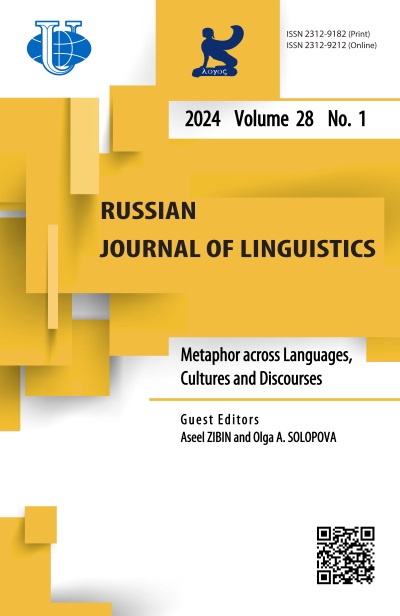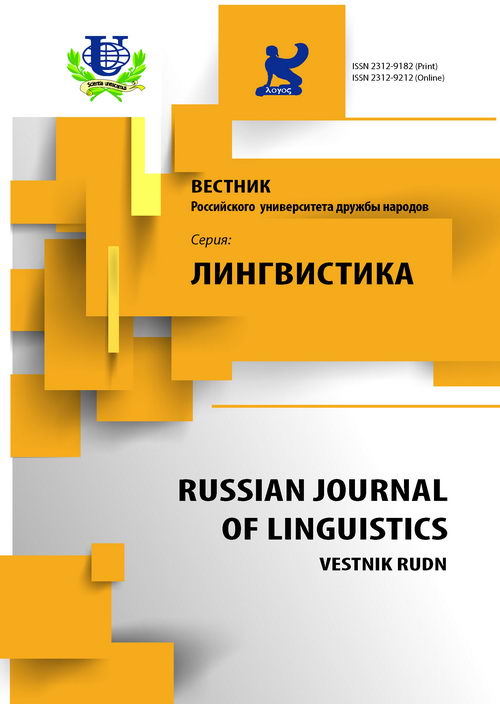Farewell - a Sorrowful Word ( Farewell - a Genre, a Concept, a Speech Act?)
- Authors: Lassan E.R.1
-
Affiliations:
- Vilnius Universitety
- Issue: No 3 (2015)
- Pages: 7-22
- Section: Articles
- URL: https://journals.rudn.ru/linguistics/article/view/9422
Cite item
Full Text
Abstract
In the article the author focuses on the concept of “farewell” and provides the procedure for its investigation different from the one having been applied in the recent decade in Russian linguistics, where the entrenchment of the latter has been affected by the influence of the school of Voronezh, as the author assumes. The author compares the concept with the frame, on the one hand, and the concept with the speech genres, on the other hand. The three “types” of farewell are being considered - a farewell to a man, a farewell to a place, a farewell to the epoch - all of them are being regarded as the modifications of the concept of “farewell”, having been conditioned to some extent by the period of time the texts had been produced in, with the concept incorporated into their headlines. The concept itself, in Foucault’s terminology, may be assigned to the concepts of discontinuity, assuming thresholds, transformations - in one case this is the transformation of a personality.
About the authors
Eleonora Rufimovna Lassan
Vilnius Universitety
Email: Eleonora-lassan@yandex.ru
Russian Philology Department Faculty of Philology
References
- Богин Г.И. Обретение способности понимать: Введение в филологическую герменевтику. М., 2001.
- Болдырев Н.Н. Концептуальное пространство когнитивной лингвистики // Вопросы когнитивной лингвистики. Тамбов: Изд-во ТГУ, 2004. № 1. C. 18-35.
- Шемарова В.А. Концептосфера «Встреча/приветствие - прощание/расставание» в русском языке (Системно-структурный и функционально-когнитивный аспекты): Дисс.. канд. филол. наук. Уфа, 2004.
- Шемарова В.А., Гайсина Р.М. ВСТРЕЧА, ПРИВЕТСТВИЕ, ПРОЩАНИЕ, РАССТАВАНИЕ // Антология концептов. Том 2. Волгоград: Парадигма, 2005. URL: http://uchebilka.ru/kultura/5517/index.html?page=4.
- Вежбицкая А. Лексикография и концептуальный анализ. М.: Языки русской культуры, 2001.
- Семухина Е.А. Концепт 'грех' в национальных языковых картинах мира: Автореф. дисс.. канд. филол. наук. Саратов, 2008.
- Дорфман И.Г. Невербальные компоненты этикетного речевого жанра приветствия/ прощания (на материале русской художественной прозы ХIХ-ХХ вв. // Известия высших учебных заведений. Поволжский регион. Гуманитарные науки. 2013. № 4 (28). С. 86-94.
- Рабенко Т.Г., Черепанова Е.А. Жанры приветствия и прощания в речи студентов // Вестник Кемеровского университета. 2008. № 2. С. 174-179.
- Попова З.Д., Стернин И.А. Очерки по когнитивной лингвистике. Воронеж: Изд-во Воронежского университета, 2001.
- Янушкевич А. и др. Примечания к тестам стихотворений // Фундаментальная электронная библиотека. URL: http://feb-web.ru/feb/zhukovsky/texts/zh0/zh1/zh1-419.
- Джеймс У. Введение в философию; Рассел Б. Проблемы философии. М.: Республика, 2000.
- Лассан Э. «Надежда»: семантический и концептуальный анализ // Respectus Philologicus. 2002. № 2. С. 28-47.
- Степанов Ю.С. Концепт // Степанов Ю.С. Константы: Словарь русской культуры. Опыт исследования. М.: Школа «Языки русской культуры», 1997. C. 40-76.
- Лассан Э. «Разлука» как ключевой концепт русской культуры // Лассан Э. Лингвокультурология. Очерк русской концептологии. Вильнюс: Вильнюсский педагогический университет, 2008. С. 66-82.
- Фуко Мишель. Археология знания. Киев: НИКА-ЦЕНТР, 1996.

















